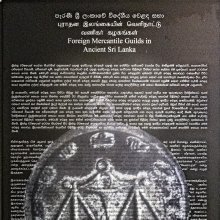Karmanta, Karmānta, Karman-anta: 9 definitions
Introduction:
Karmanta means something in Hinduism, Sanskrit, the history of ancient India. If you want to know the exact meaning, history, etymology or English translation of this term then check out the descriptions on this page. Add your comment or reference to a book if you want to contribute to this summary article.
Karmanta has 7 English definitions available.
Images (photo gallery)
Languages of India and abroad
Sanskrit dictionary
[Deutsch Wörterbuch]
Source: Cologne Digital Sanskrit Dictionaries: Böhtlingk and Roth Grosses Petersburger WörterbuchKarmānta (कर्मान्त):—(karman + anta) m. Arbeit, Geschäft, Verwaltung eines Amtes: karmāntotthitadāruvāritagatiḥ [Mṛcchakaṭikā 107, 15.] vīraniṣṭhitakarmāntaṃ gṛhaṃ bhūtapateriva [Rāmāyaṇa 5, 12, 39.] kaccinna sarve karmāntāḥ parokṣāste viśaṅkitāḥ . sarve vā punarutsṛṣṭāḥ [Mahābhārata 2, 165.] ahanyahanyavekṣeta karmāntān [Manu’s Gesetzbuch 8, 419.] ākarakarmānte bei der Verwaltung der Minen ([Kullūka]: ākareṣu suvarṇādyutpattisthāneṣu karmānteṣu ca ikṣudhānyādisaṃgrahasthāneṣu) [7, 62.] āyakarmāntavyayakarmamu [Yājñavalkya’s Gesetzbuch 1, 321.] karmānta = karmabhū bebautes Land [Hemacandra’s Abhidhānacintāmaṇi 963.]
--- OR ---
Karmānta (कर्मान्त):—vgl. aṅgāra .
--- OR ---
Karmānta (कर्मान्त):—[Spr. (II) 4238] (lies bei der Arbeit). In der Bed. Ende der Handlungen [SĀMAVIDH. BR. 1, 3, 7.]
Source: Cologne Digital Sanskrit Dictionaries: Sanskrit-Wörterbuch in kürzerer FassungKarmānta (कर्मान्त):—m. —
1) Ende einer Arbeit [Mṛcchakaṭika 107,15.] [Indische sprüche 4235.] —
2) Ende einer heiligen Handlung [Sāmavidhānabrāhmaṇa 1,3,7.] [Karmapradīpa 15,1.] —
3) Beschäftigung , Thätigkeit [Lalitavistarapurāṇa 217,18.] Geschäft , Verwaltung eines Amtes. kṛṣi Landbau [Lalitavistarapurāṇa 147,1.] —
4) *bebautes Land.
Sanskrit, also spelled संस्कृतम् (saṃskṛtam), is an ancient language of India commonly seen as the grandmother of the Indo-European language family (even English!). Closely allied with Prakrit and Pali, Sanskrit is more exhaustive in both grammar and terms and has the most extensive collection of literature in the world, greatly surpassing its sister-languages Greek and Latin.
See also (Relevant definitions)
Starts with: Karmantaka, Karmantara, Karmantaram, Karmantariya, Karmantasutra.
Ends with: Angarakakarmanta, Angarakarmanta, Jatakarmadipalashakarmanta, Krishikarmanta, Prasiddhakarmanta, Samyakkarmanta, Shila-karmanta.
Full-text: Kammanta, Karmantika, Samyakkarmanta, Angarakarmanta, Shila-karmanta, Krishikarmanta, Pralugna, Angarakakarmanta, Avadara, Karmantaka, Anuddhata, Gramiyarakana, Marga, Ayadvara.
Relevant text
Search found 12 books and stories containing Karmanta, Karmānta, Karman-anta; (plurals include: Karmantas, Karmāntas, antas). You can also click to the full overview containing English textual excerpts. Below are direct links for the most relevant articles:
The Buddha – The Everlasting < [April – June, 2007]
The Buddhist Path to Enlightenment (study) (by Dr Kala Acharya)
2.4. Right Action (Sammā-kammanta or Samyak-karmānta) < [Chapter 3 - Seven Factors of Enlightenment and Noble Eightfold Path]
2(b). The Noble Eightfold Path (Ariya-aṭṭhaṅgika-magga) < [Chapter 3 - Seven Factors of Enlightenment and Noble Eightfold Path]
Manusmriti with the Commentary of Medhatithi (by Ganganatha Jha)
Verse 7.62 < [Section IV - Duties of the King]
Jainism and Patanjali Yoga (Comparative Study) (by Deepak bagadia)
Part 3 - Essence of Indian Philosophies < [Chapter 1 - Introduction]
Part 8.8 - Buddhist Philosophy < [Chapter 1 - Introduction]
Amarakoshodghatana of Kshirasvamin (study) (by A. Yamuna Devi)
Philosophy (7): Buddhist philosophical concepts < [Chapter 4 - Cultural Aspects]
Yoga-sutras (Ancient and Modern Interpretations) (by Makarand Gopal Newalkar)


